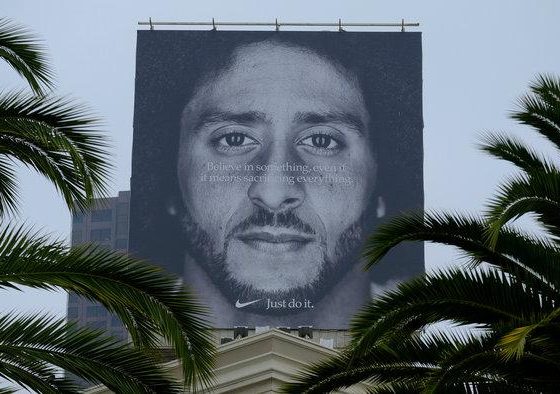“Believe in something,” former NFL quarterback Colin Kaepernick said in Nike’s latest advertising campaign, the short film “Dream Crazy (2018)”, “even if it means sacrificing everything.”
He was one of many athletes featured in the commercial, appearing alongside the likes of tennis professional Serena Williams, basketball player LeBron James and Paralympics basketball player Megan Blunk to celebrate the 30th anniversary of the company’s “Just Do It” slogan.
In the days that followed its release, though, he was considered the sole catalyst of the controversy, backlash and acclaim extended towards Nike in the aftermath.
Last August, Kaepernick triggered a nationwide conversation when during the national anthem that played before his game, he chose to kneel as a form of peaceful protest against recent incidents of police brutality against people of color. Ultimately, it resulted in Kaepernick finding himself out of work for the next season, and the issue has been largely mute in mainstream media in recent months.
At least, until the Nike commercial aired.
On social media, #BoycottNike started trending, and masses of people declared their animosity towards the brand and spread pictures of them cutting the logo off their Nike socks and burning their Nike shoes.
While many believed that these boycotts would result in economic downfall for the company, their impact was only short-term. Initially down, Nike’s stock has now risen since the release of the advertisement, and sales have shot up 31 percent.
A large part of this success can be attributed to Nike’s precise understanding of the consumers they cater to: young people.
In today’s “cancelling” culture that has facilitated both growth and toxicity to how we think, social media allows us to monitor one another’s behavior, and silence is now interpreted as a cowardly act that lacks accountability. Advocacy and communication with the consumer have become increasingly valued, and companies are no longer expected to remain objective and detached in an environment where consumers are aware of their purchasing power and who they are supporting when they empty their pockets.
While putting out this campaign can still be considered a calculated risk by Nike, it is reflective of a company that has proven itself as a supporter of social justice and marginalized athletes time and time again throughout its life span.
In the first major TV campaign the brand launched in 1968, they structured their commercial around the Beatles’ song, “Revolution”. Similar to the “Dream Crazy” commercial, the cast showcased a wide variety that ranged from professional athletes to ordinary civilians. The public reaction was identical to that we are witnessing today: initial boycott and resistance, followed by economic success.
Through campaigns such as “Revolution” and “If You Let Me Play (1995)” that consistently stayed true to their “Just Do It” message, Nike has established themselves as a respectable, reliable and well-intentioned company in the eyes of the consumers they serve. Whether or not people agree with Nike’s choice to have Kaepernick as the face of their campaign, most have little doubt that Nike included him solely because of the publicity he can garner.
Nike was able to not only survive, but thrive, after they delved into the murky waters that is politics because when the semantics of the question and the politics of it are stripped down, all of us have still bought into the “dreamer” ideology the commercial promotes.
Throughout history, it has been proven that those who know how to touch both people’s heads and hearts are the ones who hold the power, and over the years, Nike has learned how to perfect this with great success.
“Don’t ask if your dreams are crazy,” Kaepernick closes the commercial, continuing, “ask if they’re crazy enough.”










